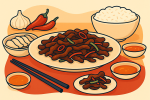Expressing Gratitude: How to Say ‘Thank You’ in Chinese
Master the art of expressing gratitude in Chinese! From a simple “xièxie” to the heartfelt “gǎn’ēn bù jìn,” this guide unlocks various ways to say “thank you” in Mandarin. Discover the nuances of formal and informal expressions, understand cultural context, and build stronger relationships. Start speaking the language of appreciation today!
Important information
- Xièxie (谢谢): This is the most common way to say “thank you” in Mandarin Chinese, suitable for most situations.
- Xièxie nǐ (谢谢你): Adding “nǐ” (you) makes it more formal, showing greater respect to elders or superiors.
- Duō xiè (多谢): Use this to express “thanks a lot” or “many thanks,” ideal for expressing stronger gratitude.
- Gǎn xiè (感谢): This conveys sincere appreciation, suitable for formal settings or written correspondence.
- Xiè le (谢了): A casual “thanks” used among close friends and family.
Expressing Gratitude in Chinese: An Overview
Expressing gratitude is essential in Chinese culture, and there are numerous phrases to convey thanks, ranging from casual to formal. The appropriate phrase depends on the context and your relationship with the person you are thanking.
Common expressions
- 谢谢 (xièxie): a simple and effective “thank you”.
- 谢谢你 (xièxie nǐ): Adding “you” makes it slightly more formal.
- 谢了 (xiè le): an informal “thanks” used among friends.
For greater favors
- 多谢 (duō xiè): expresses “thanks a lot” or “many thanks”.
- 感谢 (gǎn xiè): use this to show sincere appreciation.
Choosing wisely will allow you to perfectly convey your gratitude.
The Importance of Saying ‘Thank You’ in Mandarin Language Etiquette
Expressing gratitude is fundamental in Mandarin. Saying “thank you” not only demonstrates respect but also fosters stronger relationships and enhances communication. This simple act deepens connections and reflects courtesy, a cornerstone of Chinese culture, facilitating rapport and smoothing social interactions.
Common Phrases for Saying ‘Thank You’ in Chinese
Learn how to say “thank you” in Chinese for various situations:
Casual “Thank You”
- *Xièxie*: use it in almost any casual situation.
- *Xièxie nǐ*: a more respectful “thank you,” especially when addressing elders or colleagues, the addition of *nǐ* (you) adds a touch of formality.
- *Xiè le*: a super casual “thanks” reserved for close friends and family.
Formal “Thank You”
- *Duō xiè*: use it to express stronger gratitude, meaning “thanks a lot!”.
- *Gǎn xiè*: conveys sincere thanks for formal occasions or written correspondence.
谢谢 (xièxiè): The Standard ‘Thank You’
In Mandarin Chinese, “xièxie” is the go-to phrase for expressing gratitude. It is suitable for any occasion. Its pronunciation involves a falling tone on the first “xiè” and a neutral tone on the second. Despite its simplicity, it carries significant weight.
谢谢你 (xièxiè nǐ): A More Formal Thank You
Adding “nǐ (你),” or “you,” to “xièxiè (谢谢)” forms “xièxiè nǐ (谢谢你),” a more formal way to express gratitude. This phrase conveys greater respect and is typically used when addressing elders, superiors, or individuals you have recently met.
多谢 (duō xiè): Casual ‘Thanks a Lot’
“Duō xiè” translates to “thanks a lot” or “many thanks”. It’s a more casual way to express gratitude than the standard “xièxie”. It’s perfect for friends and suitable for colleagues as well.
感谢 (gǎn xiè): Casual Expression of Thanks
In Mandarin, “gǎn xiè” is a common way to express thanks. It’s similar to “thank you” in English, but slightly less formal. It offers a middle ground between the more formal “xièxie nǐ” and the casual “xiè le.” This makes “gǎn xiè” suitable for colleagues and acquaintances, conveying politeness with a relaxed tone.
谢了 (xiè le): The Most Casual Thanks
In Mandarin, *xiè le* offers a casual way to express thanks to close friends and family. It carries the same meaning as “thanks” or “thank you,” but is less formal than the more common *xièxie*.
Expressing Deep Gratitude in Chinese
To express sincere gratitude in Chinese, use 非常感谢你 (fēi cháng gǎn xiè nǐ), which translates to “thank you very much”. For even deeper appreciation, choose 感恩不尽 (gǎn’ēn bù jìn), meaning “I am eternally grateful”. Both options intensify the sentiment conveyed by the simpler 谢谢 (xièxiè).
非常感谢你 (fēi cháng gǎn xiè nǐ): Expressing Deep Gratitude
To express sincere gratitude in Chinese, use 非常感谢你 (fēi cháng gǎn xiè nǐ), which translates to “thank you very much” or “I’m very grateful to you”. This phrase conveys deeper appreciation than a simple “thank you” and is suitable for situations where someone has provided exceptional service or done a significant favor. It truly emphasizes the depth of your gratitude.
感恩不尽 (Gǎn’ēn bù jìn): Extreme Gratitude
In Chinese culture, “gǎn’ēn bù jìn” conveys profound gratitude, exceeding a simple “thank you.” It signifies a deep sense of indebtedness reserved for extraordinary acts of kindness. These acts may include life-saving actions or crucial support during hardship, perhaps following a grand, selfless gesture. Ultimately, “gǎn’ēn bù jìn” recognizes these significant, life-altering favors with sincere appreciation, reflecting their profound emotional impact.
Specific Situations to Say ‘Thank You’ in Chinese
Expressing sincere gratitude in Mandarin depends on the context. For significant help or numerous favors, use 感谢你为我做的一切 (Gǎn xiè nǐ wèi wǒ zuò de yī qiè), meaning “Thank you for everything you’ve done for me.” If someone simply offered assistance, 谢谢你的帮助 (Xiè xie nǐ de bāng zhù), or “Thank you for your help,” is sufficient. When addressing a group, opt for 谢谢大家 (Xiè xie dà jiā), which translates to “Thank you, all.”
感谢你为我做的一切 (Gǎn xiè nǐ wèi wǒ zuò de yī qiè): Thank You for Everything
The Chinese phrase 感谢你为我做的一切 (Gǎn xiè nǐ wèi wǒ zuò de yī qiè) translates to “Thank you for everything you’ve done for me”. This simple yet powerful expression conveys sincere gratitude when someone has offered significant kindness or support. It acknowledges their considerable effort and shows deep appreciation. It’s a heartfelt way to express thanks.
谢谢你的帮助 (Xiè xie nǐ de bāng zhù): Thank You for Your Help
The Mandarin phrase 謝謝你的幫助 (Xiè xie nǐ de bāng zhù) translates to “Thank you for your help” in English. This polite expression of gratitude is commonly used in Chinese, appropriate for both formal and informal situations. It directly acknowledges and appreciates the assistance received.
谢谢大家 (Xiè xie dà jiā): Thank You, All
“Xiexie dajia” translates to “thank you everyone” and perfectly expresses gratitude to a group. It’s equivalent to “thank you all”.
Responding to ‘Thank You’ in Chinese
There are a few ways to say “you’re welcome” in Chinese. For example, you could use 不客气 (bú kèqì) or 不用谢 (bú yòng xiè), which translates to “don’t mention it”. Both are polite responses to someone expressing thanks.
不客气 (bù kèqì): You’re Welcome
In Mandarin Chinese, the standard response to “thank you” is *bù kèqì*, a polite way to acknowledge someone’s gratitude. Alternatively, you could say *bú yòng xiè*, meaning “don’t mention it” or “no need for thanks.” Both are perfectly acceptable and courteous.
不用谢 (bú yòng xiè): Don’t Mention It
In Mandarin Chinese, “bú yòng xiè” is a polite way to respond to “thank you”. It conveys the message that the thanks aren’t necessary and the action wasn’t a bother. Similar to the English phrase “no problem”, but more formal, “bú yòng xiè” is common in everyday exchanges. You’ll hear it in various situations, from holding a door open for someone to completing a transaction at a shop or restaurant. It’s a concise and effective way to acknowledge gratitude.
















